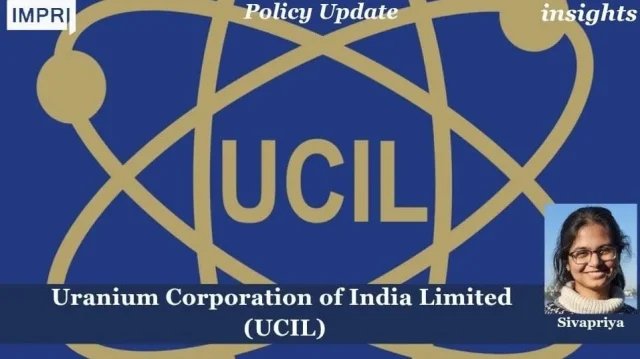Policy Update
Sivapriya

Source: https://ucil.gov.in/jobportal/public/index.php
Background
The Uranium Corporation of India Limited was established in 1967 as a Public Sector Enterprise under the administration of the Department of Atomic Energy. It operates with the vision of developing and implementing a technology suitable for mining and processing of uranium ore at a competitive cost and diversifying towards mining, tunneling, process-related consultancy, and other project implementation ventures.
Objectives
- To mine and process uranium ore, produce concentrate, and cost-effectively recover by-products
- To achieve cost effectiveness through better capacity utilization, quality improvement, and optimal use of human resources, and to maximize surplus generation through cost control measures.
- To promote human development and improve the quality of life and environment.
- To augment the processing capacity and remediation of tailings and waste dumps.
- To evaluate new deposits for opening new mines and process plants.
Major uranium deposits are found in Andhra Pradesh, Telangana, Jharkhand, and Rajasthan. The concentration of deposits in a few pockets around the country calls for better management, which is taken care of by the UCIL. Since its establishment, UCIL has been working towards bringing together India’s nuclear power and making the country self-sufficient.
Functioning
UCIL is the main organization that mines and processes uranium ore to meet the fuel needs of India’s nuclear power program. It plays an important role in the country’s nuclear power cycle and provides uranium for Pressurized Heavy Water Reactors. The company runs a combination of underground and open-pit mines, mostly found in Jharkhand and Andhra Pradesh. Jharkhand has six underground mines and one open-pit mine. Andhra Pradesh has one underground mine and a processing plant running at Tummalpalle.
After extraction, the ore is transported to processing plants in Jharkhand or Andhra Pradesh, where it is crushed and turned into a slurry. Following this, it is leached using acid-based technology to dissolve the uranium. The uranium-rich liquid is filtered, and the uranium is absorbed with an ion-exchange resin. The final product is then filtered, dried, and packed for shipment. Indian uranium ore is generally low-grade, producing large volumes of waste (tailings). Managing this radioactive and chemically toxic waste is a critical part of UCIL’s operations.
Performance
The company’s income grew from Rs. 203,479.28 lakhs in 2018-19 to Rs. 261,472.02 lakhs in 2021-22. Its net worth increased steadily from ₹282,241.59 lakhs in 2018-19 to ₹394,470.02 lakhs in 2021-22, a 13.67% rise between 2018-19 and 2019-20.
UCIL’s mines and processing plants in Jharkhand and Andhra Pradesh performed consistently well, earning an “Excellent’ MoU rating for five consecutive years until 2021-22. Despite COVID-19 challenges, production in 2021-22 exceeded targets by 3.7%. The company is expanding operations with new projects at Turamdih, Mohuldih, Nawarpahar, and Bhatin, and exploring deposits with the Atomic Minerals Directorate.
UCIL has focused on technology and safety, commissioning facilities to produce ‘Heat Treated Uranium Peroxide’ (90% uranium) as a higher-grade product.
Additionally, UCIL invested significantly in community development, spending Rs. 623.65 lakhs in 2019-20 and Rs. 1294.08 lakhs in 2021-22 on education, healthcare, skill development, and infrastructure.
Impact
UCIL has contributed a great amount of revenue to the government. In the fiscal year 2019-20, UCIL contributed ₹18,473.87 lakhs through taxes, dividends, GST, and royalties. It increased to ₹52,403.93 lakhs in 2021-22. Apart from this, the company has also encouraged indigenous technology for ore processing through acid and alkali leaching. It supports small and medium-scale industries (SMEs) through its procurement processes. In 2019-20, orders placed with SMEs were approximately ₹104.37 crores, increasing significantly to ₹229.00 crores in 2021-22. This has also led to increasing employment in the process.
UCIL remains a major employer in its areas of operations, providing the locals with jobs in its mining and processing plants. As of March 2022, the company employed 4533 people, with over 53% of the workforce belonging to Scheduled Castes and Scheduled Tribes. As a part of its CSR, the company provides education to underprivileged children in Atomic Energy Central Schools, organizes weekly medical camps by providing free medicines, and has constructed basic infrastructure like drinking water facilities, public toilets, roads, and community buildings like libraries and waiting halls.
The company generates large amounts of waste and manages it through backfilling mines – about 50% of neutralised, de-slimed tailings are used to backfill underground mine voids. Finer radioactive and toxic waste is stored on the surface in tailing ponds to prevent contamination. It is also exploring techniques like Thickened Tailings Disposal (TDD) to reduce land and environmental risk.
Challenges
- Geological: Uranium ores in India are generally low grade, small in size, and geologically complex. It requires processing large amounts of ore, leading to large volumes of waste. There are some mining sites that are deep and narrow, which require complex mining operations. UCIL uses methods like backfilling mines with de-slimed tailings and managing surface tailing ponds, but these require constant research and improvement to prevent contamination in the long run.
- Implementation delays: Securing environmental clearances and land acquisition for new and expansion projects is an ongoing issue. Legal challenges and the COVID-19 pandemic delayed the expansion of the Tummalapalle mine. The Kylleng Pyndengsohiong Mawthabah (KPM) project in Meghalaya is still on hold because local tribal groups oppose mining, seeing it as a threat to their environment.
- Strong public opposition and protests: UCIL faces strong public opposition and opposition from local communities and displaced people demanding jobs and fair compensation. These protests have frequently disrupted operations at mines such as Bagjata, Mahuldih, and Narwapahar.
Way forward
Given the challenges faced by UCIL, it needs a multi-faceted approach that focuses on increasing domestic production, using better technologies, making production environmentally friendly, and looking for international opportunities. To cut down the environmental damage caused by the low-grade uranium in India, UCIL should prioritize replacing older equipment with more efficient electro-hydraulic systems and creating eco-friendly waste management processes. Finally, it should seek international sources to ensure a steady supply of uranium, in addition to domestic sources. This will help UCIL achieve its goal of supporting India’s self-sufficient nuclear power program over time.
References
Issues at Operating Uranium Mines and Mills – India. (2023). Wise-Uranium.org. https://www.wise-uranium.org/umopin.html
MISSION/VISION AND OBJECTIVES OF UCIL 1. MISSION. (n.d.) https://www.ucil.gov.in/pdf/award/MissionVision%20and%20Objectives%20of%20UCIL.pdf
Sievert, S. (2015). An Introduction of UCIL. Ucil.gov.in. https://www.ucil.gov.in/about.html
UCIL Annual Report 2022. (n.d.). Retrieved October 2, 2025, from https://ucil.gov.in/pdf/report/2639_08_2022_UCIL%20Annual%20Report%2022%20Eng_compressed%20(1).pdf
Uranium Corporation of India Limited: Wasting Away Tribal Lands | corpwatch. (n.d.). Www.corpwatch.org. https://www.corpwatch.org/article/uranium-corporation-india-limited-wasting-away-tribal-lands
About the author: Sivapriya is a research intern at IMPRI. She is pursuing a BA(Hons) Economics degree from Miranda House College, University of Delhi.
Acknowledgement: The author sincerely thanks Aasthaba Jadeja and other IMPRI fellows for their valuable contribution.
Disclaimer: All views expressed in the article belong to the author and not necessarily to the organisation.
Read more at IMPRI
India-Australia Critical Minerals Partnership
India-Vietnam–Naval Capacity Building: Anchoring Stability in the Indo-Pacific



















